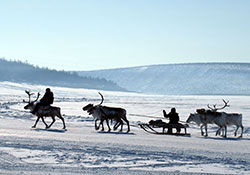Russian Federation

iStockphoto
The project focuses on a particular area in the Russian Arctic, the Arkhangelsk district. This district is located in the northern Russia, touching the White Sea in the North, and is representative for its neighbouring Arctic districts.
Projections indicate an increase by 3-4°C in average annual air temperatures by 2050 in western Siberia. According to Arctic Climate Assessment, climate change will influence public health, particularly in the small indigenous communities of the Arctic, through thermal stress and changes in local fauna, which are associated with changes in the pattern of transmission of infectious diseases, respiratory diseases and cardiovascular diseases.
One of the main concerns about climate change effects on health relates to the difficulties in transportation and health service delivery due to permafrost thawing.
Project country-specific activities to protect health from climate change
- Assess health impact, vulnerability and health system adaptation
- Develop a district health adaptation strategy
- Improve delivery of primary health care in remote areas particular affected in the district
- Increase surveillance from (potential) infectious diseases associated to climate change, with particular emphasis on water- and vectorborne diseases
- Increase capacity, training and awareness of the health sector on the health effects of climate change.
Contacts: Dr Elena Yurasova, National Professional Officer, email: e.yurasova@who.org.ru



